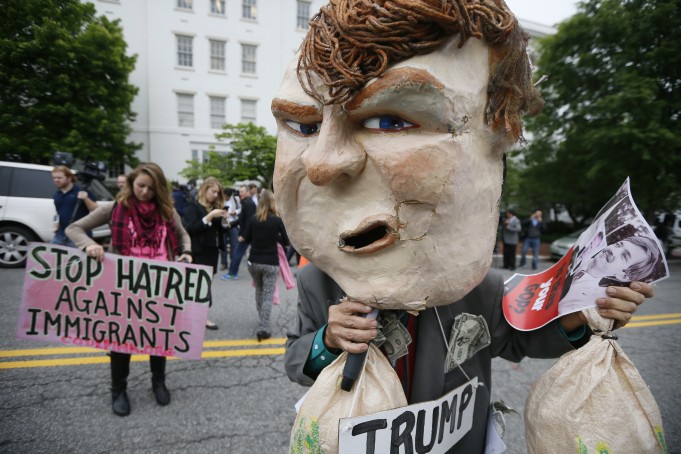NEW YORK (Reuters) – Democratic Party activists in some U.S. states are using Donald Trump, the Republican presidential candidate who has stirred controversy with his comments about illegal immigrants and women, as the centerpiece of their “get out the vote” campaign for the November elections.
In California, canvassers from the Orange County Democrats carry pictures of Trump when they knock on doors ahead of the June 7 California primary. They ask if people will vote in the primary, and warn that if they don’t help pick the strongest possible Democrat, “this guy will win,” said Henry Vandermeir, the local party chairman in Orange County, a traditionally Republican island in the state.
Democrats in New Hampshire have unveiled Trump/Sununu lawn signs, looking to tie Republican gubernatorial candidate Chris Sununu to the presumptive Republican presidential nominee on issues such as climate change (Trump is a skeptic) and healthcare.
One sign reads: “Trump/Sununu. Because Health Care Is For Losers,” a swipe at Trump’s vow to repeal the Affordable Care Act, President Barack Obama’s signature healthcare law.
“Every state party is trying to maximize what they can get out of this difference (between candidates) and to tie Trump to the Republicans in the state,” said Holly Shulman, a spokeswoman for the New Hampshire Democratic Party.
The Trump campaign did not respond to a request for comment.
To be sure, Republicans appear likely to use Hillary Clinton, the frontrunner for the Democratic nomination who is also a polarizing figure, in a similar fashion.
“There is no better volunteer recruitment tool, fundraising pitch, or unifier for the Republican Party than the prospect of a Hillary Clinton presidency that will surely take us further backwards,” the Republican National Committee said in a statement.

“RETRUMPLICANS”
Democrats are also looking to tie Trump to Republican Senate candidates on the Nov. 8 ballot as they seek to regain control of the chamber they lost in the 2014 congressional elections.
The Democratic Senatorial Campaign Committee last week released so-called “Trump cards” online, equating several Republican senators’ policy positions with those of the New York developer.
For Pennsylvania Republican Pat Toomey and New Hampshire’s Kelly Ayotte, for example, the DSCC highlighted how they and Trump oppose a federal minimum wage hike.
The DSCC also launched a website in March, partyoftrump.com, which labeled some senators “Retrumplicans” and asked for donations to help fight senators who support Trump.
Recent polls suggest that a Trump/Clinton matchup could be a tight race. The two candidates were in a dead heat in the three key swing states of Florida, Ohio and Pennsylvania in a Quinnipiac University poll earlier in May.
And a Reuters poll this month showed that much of the backing for Clinton and Trump comes from people whose primary motivation is to stop the other side from winning, rather than any love for either of the two candidates or their policies.
The strategy of highlighting opposing candidates is not without risks, according to Bruce Newman, the author of “The Marketing Revolution in Politics: What Recent U.S. Presidential Campaigns Can Teach Us About Effective Marketing.”
If Trump – who shocked pundits by beating 16 other Republican hopefuls for the nomination – proves more attractive to the general electorate than Hillary Clinton, then tying him to other Republicans could hurt Democrats
“We don’t know how popular this guy is going to get,” Newman said. “This is just the beginning.”



































